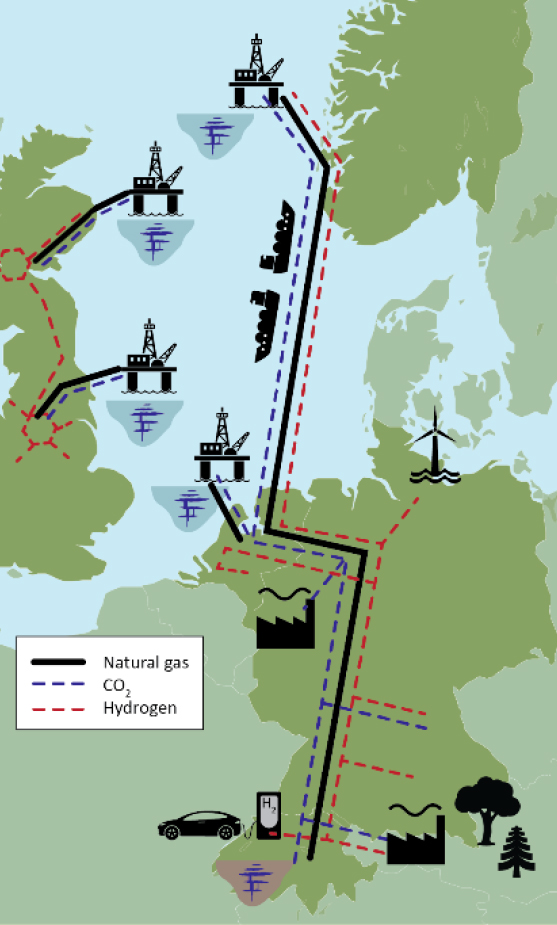New research using hydrogen aims to take the carbon out of heating
13/11/2017 By BGS Press
The British Geological Survey (BGS) will lead the case study to support the decarbonisation of heating for large UK cities using novel hydrogen-based technology in the recently funded ELEGANCY research project. This project is one of five supported by the UK Department for Business, Energy and Industrial Strategy (BEIS) with co-funding from the EU.
The need to reduce emissions is vital to enable the UK to meet the greenhouse gas targets agreed at the COP21 Paris climate change meeting: to keep global temperature increase below 2°C. The recently published BEIS UK Clean Growth Strategy also recognises carbon (CO2) capture, utilisation and storage (CCUS) as a key part of the UK’s decarbonisation plans, linked directly to our industrial hubs and to future expansion of the hydrogen economy.
Since 2015, the UK industry and research sectors have achieved much to demonstrate the UK’s capability and capacity for CCUS. The objective of ELEGANCY is development of cost-effective technologies to reduce CO2 emissions from domestic heating currently released into the atmosphere, by use of hydrogen and CCUS.
The ELEGANCY project will provide cutting-edge practical solutions to key research and technical challenges to support the low-carbon economy through hydrogen production with CCUS in the UK. It will consider the systems and technologies needed to decarbonise power, heating and transport using molecular hydrogen (H2) as a low-carbon fuel for heating, cooling, transport and industrial processes. The hydrogen is generated by the reformation of natural gas with offshore geological storage of the produced CO2.
ELEGANCY addresses fundamental pilot site and experimental research, including BGS biogeochemical laboratories, and considers the business case, tools to identify cost-effective transport and storage options and environmental impact and social acceptance for H2 and CCUS.
ELEGANCY will provide three crucial benefits: 1) the decarbonisation of power, heating and transport based on an existing fuel and infrastructure 2) a commercial model for industrial CCUS and 3) the opportunity to broaden public awareness of CCUS. This includes large-scale CO2 transport and storage infrastructure for use by other sectors, as well as infrastructure for the rapid introduction of H2 as an energy carrier, thus also opening the door for H2 generated from spare capacity in renewable sources. It will enable Europe to export extensive knowledge, products and technologies worldwide.
The partners in the ELEGANCY project are world leaders in their respective fields. They comprise of highly respected research institutions and legal experts, technology vendors, natural gas grid operators and international energy and petrochemical companies. Industry partners will play a key role in the implementation of the project: research findings will be appraised by INEOS, Statoil, Energie 360°, Open Grid Europe and Gassco for their potential and relevance; Climeworks, Uniper Energy Storage, and Aker Solutions will develop and evaluate technologies; GERG and Scottish Enterprise will enhance the dissemination of key results.
Dr Maxine Akhurst, leader of the UK case study in ELEGANCY, said “Fundamental research into geological storage of CO2 generated by hydrogen reformation, its impact on storage formations and seasonality of supply, will support the appraisal of low-carbon heating of large cities to reduce emissions in the UK”
The ELEGANCY project is one of three in which BGS will participate over the next three years. The combined resources for BGS for the three projects are in excess of €2M and will engage the expertise and knowledge of CCS and laboratory staff at the BGS offices in Edinburgh and Nottingham.
For further details or to arrange media interviews please contact:
Kirstin Lemon, BGS Press Office, Keyworth, Nottingham, NG12 5GG
Mobile: +44 (0)7989 115657 E-mail: klem@bgs.ac.uk
The following are available for interview:
- Jonathan Pearce, British Geological Survey
- Dr Maxine Akhurst, British Geological Survey
For further information on the ELEGANCY project, please see: www.sintef.no/en/projects/legancy-enabling-a-low-carbon-economy-via-hydrogen-and-ccs
For additional information go to: www.bgs.ac.uk
The British Geological Survey
The British Geological Survey (BGS), a component body of the Natural Environment Research Council (NERC), is the nation’s principal supplier of objective, impartial and up-to-date geological expertise and information for decision making for governmental, commercial and individual users. The BGS maintains and develops the nation’s understanding of its geology to improve policy making, enhance national wealth and reduce risk. It also collaborates with the national and international scientific community in carrying out research in strategic areas, including energy and natural resources, our vulnerability to environmental change and hazards, and our general knowledge of the Earth system. More about the BGS can be found at www.bgs.ac.uk.
The Natural Environment Research Council
The Natural Environment Research Council (NERC) is the UK’s main agency for funding and managing world-class research, training and knowledge exchange in the environmental sciences. It coordinates some of the world’s most exciting research projects, tackling major issues such as climate change, food security, environmental influences on human health, the genetic make-up of life on earth, and much more. NERC receives around £300 million a year from the government’s science budget, which it uses to fund research and training in universities and its own research centres. www.nerc.ac.uk



